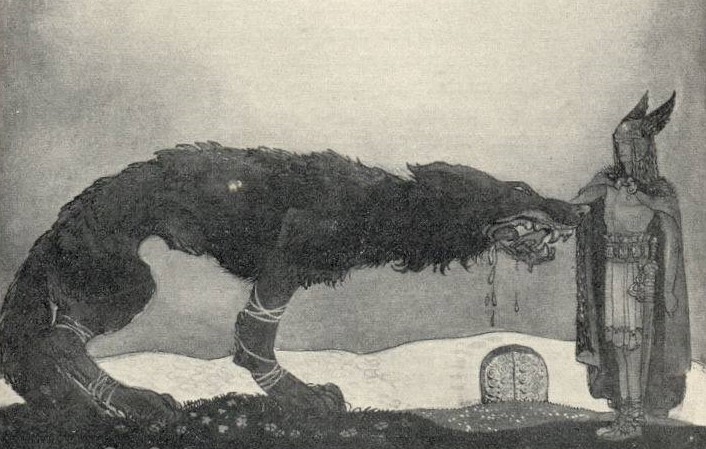Tyr’s sacrifice silences Fenrir’s mighty, an intriguing and timeless tale from Norse mythology, recounts the heroic act of Tyr, the god of war and law, who sacrifices his hand to bind the monstrous wolf Fenrir, ensuring the preservation of the cosmos.
This captivating narrative explores themes of courage, sacrifice, and the intricate interplay between gods, monsters, and the fate of the world.
As the story unfolds, we witness the gods’ desperate attempts to restrain the formidable Fenrir, whose immense power threatens to plunge the cosmos into chaos. Tyr’s unwavering bravery and willingness to sacrifice his own well-being for the greater good stand as a testament to the indomitable spirit of the gods and the enduring power of sacrifice.
Tyr’s Sacrifice: The Context: Tyr’s Sacrifice Silences Fenrir’s Mighty

Norse mythology, a rich tapestry of gods, giants, and mythical creatures, has captured the imagination of scholars and enthusiasts alike for centuries. Among the pantheon of Norse deities, Tyr stands out as a figure of courage and sacrifice, known for his pivotal role in the binding of Fenrir, the monstrous wolf destined to bring about the end of the world.
Tyr, the god of war and law, was renowned for his bravery and unwavering loyalty. He played a central role in the governance of Asgard, the realm of the gods, and was highly respected for his wisdom and judgment.
The circumstances leading to Tyr’s sacrifice stem from a prophecy foretelling the catastrophic events of Ragnarok, the twilight of the gods. Fenrir, the monstrous offspring of Loki and Angrboda, was destined to break free from his chains and wreak havoc upon the cosmos.
To prevent this cataclysm, the gods sought to bind Fenrir securely.
The Binding of Fenrir: The Consequences
Fenrir’s immense strength and cunning posed a formidable challenge to the gods. They crafted a magical chain called Gleipnir, forged from the roots of mountains, the sinews of bears, and the breath of fish. Despite its extraordinary properties, Fenrir was initially reluctant to accept the chain.
To gain Fenrir’s trust, Tyr stepped forward and offered his right hand as a pledge of good faith. Fenrir, seeing Tyr’s sincerity, allowed the chain to be placed around his neck. However, as the gods tightened the chain, Fenrir realized the deception and bit off Tyr’s hand.
Fenrir’s binding had profound consequences for the gods and the cosmos. The monstrous wolf was effectively neutralized, preventing the catastrophic events of Ragnarok. However, Tyr’s sacrifice came at a great cost, as he lost his right hand in the process.
Tyr’s Courage and Sacrifice
Tyr’s sacrifice stands as a testament to his unwavering courage and selfless devotion to the preservation of Asgard. His willingness to risk his own well-being for the greater good exemplifies the highest ideals of heroism and duty.
The symbolism behind Tyr’s sacrifice is profound. The loss of his right hand, a symbol of strength and authority, represents the ultimate sacrifice that one can make for the sake of others. Tyr’s sacrifice not only prevented Ragnarok but also ensured the continued existence of the cosmos.
The impact of Tyr’s sacrifice extended beyond the immediate consequences. His act of courage inspired the gods and mortals alike, demonstrating the power of selflessness and the importance of facing adversity with determination.
The Silencing of Fenrir: The Aftermath
Tyr’s sacrifice had an immediate and profound effect on Fenrir. The monstrous wolf, once a symbol of chaos and destruction, was silenced. His relentless howling ceased, and he was effectively neutralized, unable to pose a threat to the gods or the cosmos.
Tyr’s sacrifice ultimately contributed to the preservation of the cosmos. By binding Fenrir, the gods prevented the catastrophic events of Ragnarok, ensuring the continued existence of Asgard and the other realms.
The mythological implications of Fenrir’s silence are far-reaching. The silencing of the monstrous wolf represents the triumph of order over chaos, the preservation of the established world against the forces of destruction.
Comparative Analysis: Other Sacrifices in Mythology, Tyr’s sacrifice silences fenrir’s mighty
Tyr’s sacrifice is not an isolated incident in mythology. Across cultures and traditions, stories of heroic individuals sacrificing themselves for the greater good abound.
In Greek mythology, Prometheus stole fire from the gods to bestow upon humanity, knowing full well that he would be punished severely for his actions. In Hindu mythology, the god Vishnu sacrificed his own body to protect the universe from destruction.
These sacrifices share common motivations and outcomes. The individuals involved are typically driven by a profound sense of duty and compassion, willing to make the ultimate sacrifice for the benefit of others. Their sacrifices often result in the preservation of order, the triumph of good over evil, or the renewal of life.
Cultural and Literary Impact
Tyr’s sacrifice has had a profound impact on Norse culture and beyond. The story has been passed down through generations in sagas and poems, inspiring countless works of art and literature.
In Norse culture, Tyr’s sacrifice is seen as a symbol of courage, loyalty, and selflessness. His name is invoked in oaths and invocations, and his image is often depicted in carvings and other artistic representations.
Tyr’s sacrifice has also influenced modern art and literature. The story has been adapted into plays, operas, and films, exploring the themes of heroism, sacrifice, and the struggle between good and evil.
Popular Questions
What is the significance of Tyr’s sacrifice in Norse mythology?
Tyr’s sacrifice is a pivotal event in Norse mythology, symbolizing courage, selflessness, and the preservation of cosmic order.
How does Tyr’s sacrifice contribute to the binding of Fenrir?
Tyr’s sacrifice of his hand allows the gods to bind Fenrir with an unbreakable chain, preventing the wolf from causing chaos during Ragnarok.
What are the mythological implications of Fenrir’s silence?
Fenrir’s silence represents the containment of chaos and the triumph of order over destructive forces.

